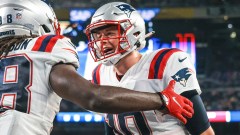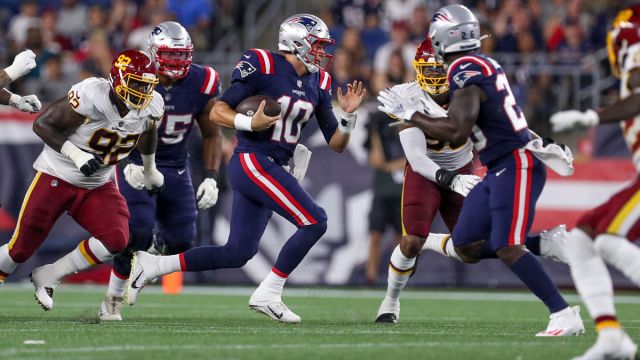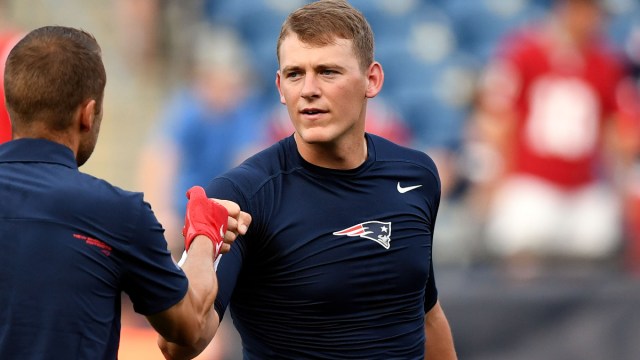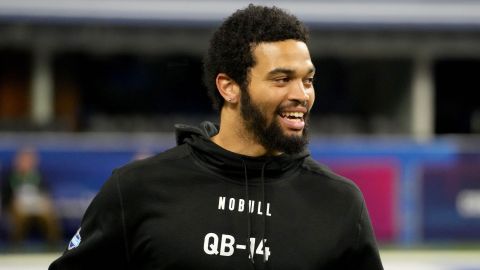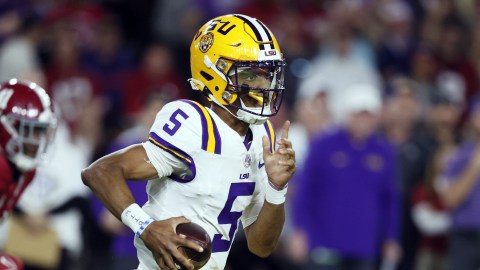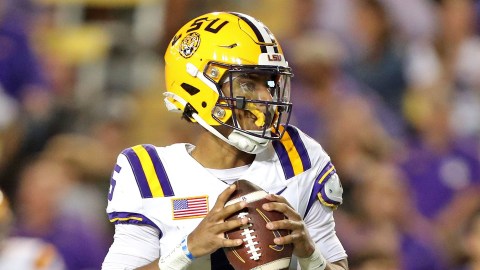NFL teams that enter seasons with rookie starting quarterbacks typically don’t find immediate success.
But most of those rookies don’t have the supporting cast and organization stability that Mac Jones will enjoy as he begins his New England Patriots career.
Jones, who beat out Cam Newton for the starting job and has garnered rave reviews from Patriots veterans, will be leading a team that handed out upward of $170 million in guaranteed money to free agents this offseason.
One with an offensive line, run game and defense that all could rank among the NFL’s best.
One that’s less than two years removed from its most recent playoff berth and still has several core players from its last Super Bowl title run.
And one, of course, that’s led by the game’s best coach (Bill Belichick) and one of its top offensive minds (Josh McDaniels).
A total of 11 rookie QBs have started season openers since 2013. See if you can spot the outlier:
2020
Joe Burrow, Cincinnati Bengals (first round, first overall)
10 starts
65.3 percent, 2,688 yards, 13 touchdowns, five interceptions, 6.7 YPA, 89.8 passer rating
2-7-1 record (team record: 4-11-1)
2019
Kyler Murray, Arizona Cardinals (first round, first overall)
16 starts
64.4 percent, 3,722 yards, 20 touchdowns, 12 interceptions, 6.9 YPA, 87.4 passer rating
5-10-1 record
2018
Sam Darnold, New York Jets (first round, third overall)
13 starts
57.7 percent, 2,865 yards, 17 touchdowns, 15 interceptions, 6.9 YPA, 77.6 passer rating
4-9 record (team record: 4-12)
2017
DeShone Kizer, Cleveland Browns (second round, 52nd overall)
15 starts
53.6 percent, 2,894 yards, 11 touchdowns, 22 interceptions, 6.1 YPA, 60.5 passer rating
0-15 record (team record: 0-16)
2016
Carson Wentz, Philadelphia Eagles (first round, second overall)
16 starts
62.4 percent, 3,782 yards, 16 touchdowns, 14 interceptions, 6.2 YPA, 79.3 passer rating
7-9 record
Dak Prescott, Dallas Cowboys (fourth round, 135th overall)
16 starts
67.8 percent, 3,667 yards, 23 touchdowns, four interceptions, 8.0 YPA, 104.9 passer rating
13-3 record
2015
Jameis Winston, Tampa Bay Buccaneers (first round, first overall)
16 starts
58.3 percent, 4,042 yards, 22 touchdowns, 15 interceptions, 7.1 YPA, 84.2 passer rating
6-10 record
Marcus Mariota, Tennessee Titans (first round, second overall)
12 starts
62.2 percent, 2,818 yards, 19 touchdowns, 10 interceptions, 7.6 YPA, 91.5 passer rating
3-9 record (team record: 3-13)
2014
Derek Carr, Oakland Raiders (first round, 36th overall)
16 starts
58.1 percent, 3,270 yards, 21 touchdowns, 12 interceptions, 5.3 YPA, 76.6 passer rating
3-13 record
2013
EJ Manuel, Buffalo Bills (first round, 16th overall)
10 starts
58.8 percent, 1,972 yards, 11 touchdowns, nine interceptions, 6.4 YPA, 77.7 passer rating
4-6 record (team record: 6-10)
Geno Smith, New York Jets (second round, 39th overall)
16 starts
55.8 percent, 3,046 yards, 12 touchdowns, 21 interceptions, 6.9 YPA, 66.5 passer rating
8-8 record
In all but one instance, the team starting the rookie behind center finished at or below .500 and missed the playoffs. Ten of these first-year signal-callers also failed to crack the top 10 in the NFL in any of the listed statistical categories.
The one exception, in both cases, is Prescott. In 2016, he took over a Cowboys team that had gone 12-4 two years prior, then nosedived to 4-12 thanks to a Tony Romo injury that forced Matt Cassel, Kellen Moore and Brandon Weeden to make 12 starts between them.
Prescott had a superb debut season — one of the best by any rookie in recent memory — ranking fourth or better in completion percentage, yards per attempt, passer rating, QBR and a handful of advanced metrics. But he also benefitted from playing on a team that boasted the NFL’s second-ranked rushing attack (led by fellow 2016 draftee Ezekiel Elliott) and the fifth-ranked scoring defense.
That made for a smoother transition than Prescott might have experienced with, say, the Tampa Bay Buccaneers, who’d gone seven years without a postseason appearance when they handed the keys to Winston in 2015.
Talent obviously is important for a rookie quarterback. But the infrastructure around him is, too.
Consider this: Since 2002, a total of six teams have started a rookie QB in Week 1 after reaching the playoffs within the previous two years. All six made the playoffs again that season, including a 2003 Baltimore Ravens squad led (for the first nine games, at least) by first-round draft bust Kyle Boller:
2016 Dallas Cowboys (Dak Prescott)
2012 Indianapolis Colts (Andrew Luck)
2012 Seattle Seahawks (Russell Wilson)
2011 Cincinnati Bengals (Andy Dalton)
2008 Baltimore Ravens (Joe Flacco)
2003 Baltimore Ravens (Kyle Boller)
Just one of those six quarterbacks (Luck) was drafted in the top 15.
(The last such team to miss out on the postseason? Quincy Carter’s 2001 Cowboys, who went 5-11.)
The Patriots, who managed to cobble together seven wins last season despite fielding their weakest roster in two decades, have surrounded Jones with enough talent to withstand his inevitable rookie errors.
He shouldn’t be running for his life behind New England’s well-stocked O-line — Isaiah Wynn, Mike Onwenu, David Andrews, Shaq Mason and Trent Brown are a rock-solid starting five — and with quality pieces in the backfield and on defense, the Patriots won’t feel pressured to put every game on their first-round draft pick’s shoulders.
Barring a major injury or full-blown implosion from the former Alabama standout, the Patriots should be right back in playoff contention this season.

